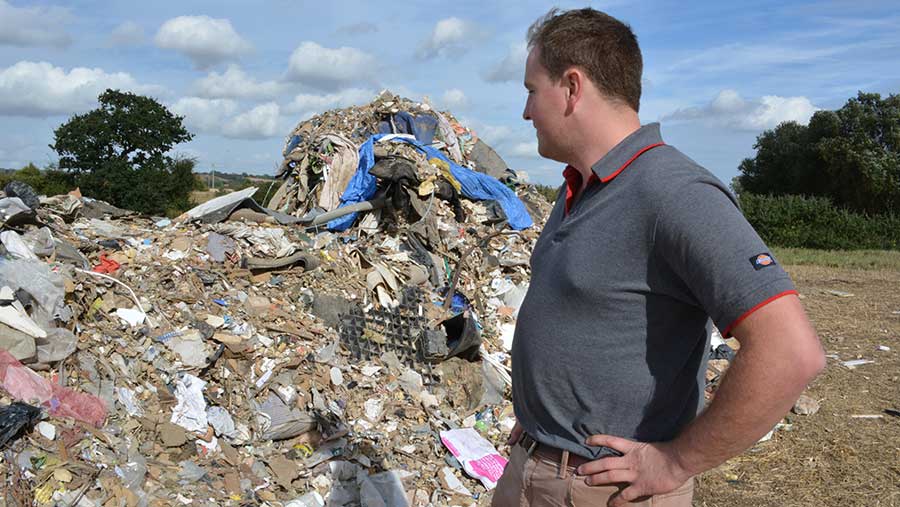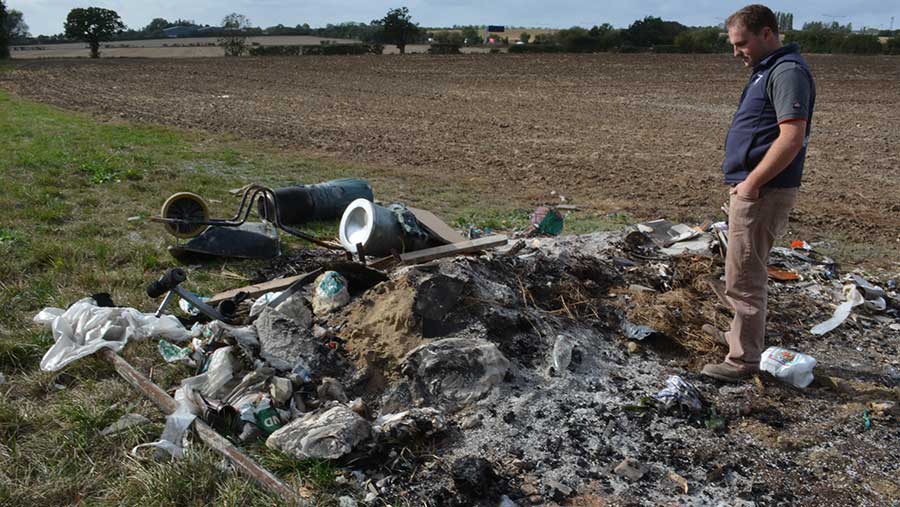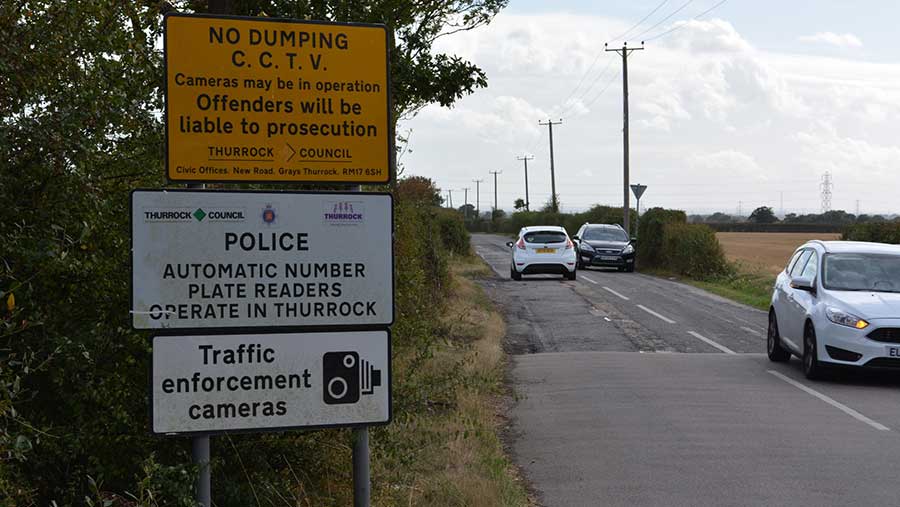‘Fly-tipping is our bovine TB,’ says Essex farm crime victim
 Fly tipping on Ed Ford's farm
Fly tipping on Ed Ford's farm The fly-tipping epidemic blighting farms in Essex is on a par with bovine TB devastating herds in Gloucestershire, according to young farmer Ed Ford.
Mr Ford, who farms at Childerditch, near Brentwood, spoke out as councils in England and Wales launched a pre-Christmas zero-tolerance crackdown on fly-tipping.
As part of the “no nonsense” approach, new powers to seize and crush vehicles used by dumpers will be used.
See also: Petition calls for tougher penalties for rural fly-tippers
Councils are also calling for a legal loophole – which means enforcement officers have to give some fly-tippers seven days written warning before inspecting them and seizing evidence – to be closed immediately to help tackle the growing problem.

Ed Ford surveys burnt out refuse from fly tipping
New legislation, which was introduced in May, allows councils to issue on-the-spot fines of up to £400 for fly-tippers who make residents’ lives hell and cost taxpayers millions of pounds.
Brazen fly-tippers are increasingly leaving lorry loads of waste in roads and farmers’ fields, according to the Local Government Association (LGA).
Essex young farmer Ed Ford welcomed the council crackdown, but said he doubted whether it would make much difference to him and other farmers who were similarly blighted by fly-tipping.
“In Gloucestershire, they have bovine TB, here we have fly-tipping,” said Mr Ford. “This is our TB. This is our problem.”
See also: Photos – Cannabis factory waste dumped on Essex farm
Mr Ford said commercial fly-tippers were targeting his farm on a weekly basis and councils were under no obligation to clear up any waste dumped on private farmland, so his farm business was left with the clean-up bill.
This is getting ridiculous now. Artic load of comecial fly tipping in our field @EssexPoliceUK@thurrockcouncil RT pic.twitter.com/pmQwoiIvdc
— Edward Ford (@Ed_Farmer_Ford) September 22, 2016
“It’s absolutely ridiculous. Police are happy to push drink-driving campaigns at Christmas because it gets them a lot of publicity. But nothing is being done to tackle fly-tipping on farms and in the countryside,” he added.
“The police, councils and the Environment Agency don’t have the money. This is about commercial fly-tipping happening on farms at night. We know who is doing it, they know who is doing it. But they don’t have the resource to tackle it.”
More commercial fly tipping overnight on Thurs 8th into Fri 9th… #NorthStifford @ThurrockCPT @ThurrockCSP @EnvAgency with @PCPaulGlensman pic.twitter.com/QVRL0DLWtD
— Rob Watts (@PCRobWatts) December 10, 2016
Last week Mr Ford telephoned Essex Police to request a helicopter to catch fly-tippers in the process of dumping waste on his farm.
“They said there is one police helicopter covering the South East and unless someone is missing or a life is at risk, they don’t deploy it.”
Fly-tipping on the rise
The cost for councils of clearing up fly-tipping is almost £50m across England, with the recorded incidents rising 6% in 2014/15, the latest figures available with 900,000 dealt with during this time.
New figures released for Wales during 2015-16 showed local authorities reported 36,259 fly-tipping incidents, representing an annual increase of around 4,500 incidents (14%). During this period, fly-tipping clearance costs rose to £2.1m from £1.8m in 2014/15.

Warning signs on the road at Ed Ford’s farm
LGA environment spokesman Cllr Martin Tett said: “At a time when councils face difficult choices about services in light of reducing budgets, they are having to spend a vast amount each year on tackling litter and fly-tipping.
“This is money that would be better spent on vital services such as filling potholes and caring for the elderly. Litter and fly-tipping is environmental vandalism – it’s unpleasant, unnecessary and unacceptable.”
